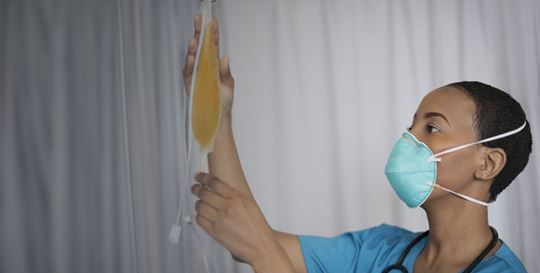Just over 100 years ago, the Spanish flu pandemic raged across the world. Reflecting on that pandemic has helped us navigate the current coronavirus crisis—including inspiring scientists and physicians to turn to transfusions of convalescent plasma as a potential treatment.
The convalescent plasma method has a simple premise: administer plasma of individuals who recovered and have antibodies to the pathogen, to those who are still fighting the disease, essentially transferring their immune response. Early studies in small populations of patients show promise and diagnostic experts are sprinting to make plasma treatment a viable option in the fight against COVID-19.
Plasma, the liquid component of blood, contains vital antibodies that could boost a person’s ability to fight the disease. Plasma containing neutralizing antibodies may be administered to reduce symptoms, prevent death and speed recovery among the seriously ill with a specific infection. This treatment pathway can be made available to patients right away, while a vaccine or new drugs could take 18 months or more to be available.
Currently, the challenge is the short supply of donors. It takes a tremendous amount of time and effort to qualify each potential donor. Once identified, the mix and concentration of antibodies differs from one donor to another. While we don’t yet know what levels of IgG antibodies are required for lasting coronavirus immunity, an IgG-specific serology test conducted in conjunction with routine health tests could help us identify potential donors.
As we turn to convalescent plasma as a treatment for COVID-19, it is important to note a few critical requirements:
- A population of donors who have the IgG antibodies and can donate convalescent plasma
- Additional blood banking facilities, although organizations such as the Red Cross are working tirelessly to procure plasma donations
- Reliable serological assays to quantify levels of SARS-CoV-2 antibodies in plasma
- Virologic assays to measure neutralization
- Clinical trials to assess the efficacy of plasma treatment
Physicians and scientists are joining forces to take on these impending challenges, including, assessing the efficacy of interventions, while diagnostic manufacturers and industry leaders are pooling resources to support the availability of assays. Everyone is stepping up to help make “liquid gold” more broadly available as it becomes an important tool in our arsenal of treatments against COVID-19.

 English
English





